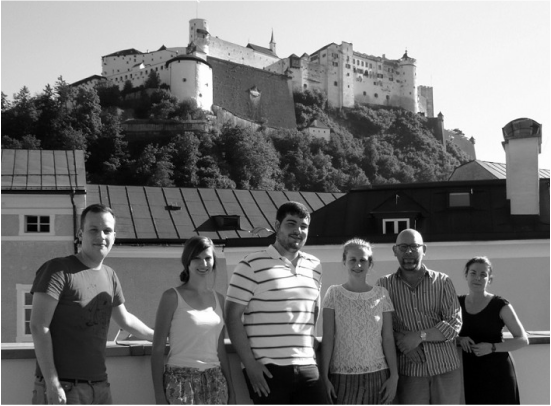CURRENT AND PAST PROJECTS
Gender in Contemporary Europe: Rethinking Equality and the Backlash
Round 11 (2022/23) of the European Social Survey (ESS)
Our module of survey questions aims to better understand contemporary gender attitudes in Europe through mapping feminine and masculine identities, sexist attitudes, perceptions of gender based discrimination. These attitudes are important to not only the status of women and potential for social change but also how these attitudes are interconnected and lead to or act as a barrier to progressive attitudes about policies to improve gender equality. The five interconnected dimensions are: (i) feminine and masculine identities that indicate adherence to male and female role orientations and feminine and masculine norms, including their salience; (ii) sexism -- gauging benevolent, hostile and modern sexism as prejudice against women and against progress toward gender equality; (iii) perceptions of gender sex-based discrimination indicating the extent to which discrimination against women exists across various social structures (e.g. work, family, politics); (iv) salience of gender equality as a social value; (v) preferences about policies to redress social inequalities driven by gender power differentials as expressed through traditionally gender roles.
PROJECT-TEAM
Round 11 (2022/23) of the European Social Survey (ESS)
Our module of survey questions aims to better understand contemporary gender attitudes in Europe through mapping feminine and masculine identities, sexist attitudes, perceptions of gender based discrimination. These attitudes are important to not only the status of women and potential for social change but also how these attitudes are interconnected and lead to or act as a barrier to progressive attitudes about policies to improve gender equality. The five interconnected dimensions are: (i) feminine and masculine identities that indicate adherence to male and female role orientations and feminine and masculine norms, including their salience; (ii) sexism -- gauging benevolent, hostile and modern sexism as prejudice against women and against progress toward gender equality; (iii) perceptions of gender sex-based discrimination indicating the extent to which discrimination against women exists across various social structures (e.g. work, family, politics); (iv) salience of gender equality as a social value; (v) preferences about policies to redress social inequalities driven by gender power differentials as expressed through traditionally gender roles.
PROJECT-TEAM
- Amy Alexander (University of Gothenburg)
- Susan Banducci (University of Exeter)
- Hilde Coffe (University of Bath)
- Marta Fraile (Institute of Public Goods and Policies (CSIC))
The Consequences of Electoral System Change in Modern Democracies (With Philipp Harfst) jointly funded by the Fonds zur Förderung der wissenschaftlichen Forschung (FWF Austria) and the Deutsche Forschungsgemeinschaft (DFG Germany) .
What happens when electoral rules change? The objective of this project is to examine the consequences of electoral system change on a series of politically relevant factors such as the size and composition of party systems, political representation and the overall level of democratic quality. A central aspect of the project will revolve around the collection of data depicting electoral institutions and their consequences at the national level, the electoral districts, as well as on the individual level in advanced industrial democracies. Quantitative comparative analyses will allow us then, to challenge the validity of established fundamental assumptions of electoral research. Thereby, the project seeks to investigate the extent to which political institutions structure the behavior of political actors. The findings seek to enhance the current body of literature and theories on electoral system change and may also provide new insights for engineers of electoral rules.
PROJECT-TEAM
- Philipp Harfst (Universität Greifswald)
- Jessica Fortin-Rittberger (Universität Salzburg)
- Sarah Dingler (Universität Salzburg)
- Julian Noseck (Universität Greifswald)
Follow Sarah and Corinna Kroeber on the successor Twitter account! @ElectSystProj

The Electoral Success of Women at Different levels of Government (With Christina Eder) Funded by the Fritz Thyssen Foundation
The conventional wisdom in the literature on the representation of women holds that the proportion of women in representative bodies decreasesas we climb government levels. In other words, the more powerful and prestigious the positions, the fewer the women we find. From this conventional wisdom, we should expect women to be more frequently politically engaged on the local level than on the national stage. Our preliminary observations in Germany indicate that we should reverse this conventional wisdom as we find fewer women in local level assemblies than at any other level. This observation represents an important puzzle as it challenges a vast body of theories on the determinants of women’s representation. In addition to this puzzle, researchers to date have been hampered by the absence of data detailing the socio-demographic background of elected representatives at different levels of government. Aside from this substantive focus, one of the main objectives of this project is the production of a data base detailing the composition of representative bodies on all levels of German government for a period of 20 years.
PROJECT RELATED PUBLICATIONS
PROJECT-TEAM
The conventional wisdom in the literature on the representation of women holds that the proportion of women in representative bodies decreasesas we climb government levels. In other words, the more powerful and prestigious the positions, the fewer the women we find. From this conventional wisdom, we should expect women to be more frequently politically engaged on the local level than on the national stage. Our preliminary observations in Germany indicate that we should reverse this conventional wisdom as we find fewer women in local level assemblies than at any other level. This observation represents an important puzzle as it challenges a vast body of theories on the determinants of women’s representation. In addition to this puzzle, researchers to date have been hampered by the absence of data detailing the socio-demographic background of elected representatives at different levels of government. Aside from this substantive focus, one of the main objectives of this project is the production of a data base detailing the composition of representative bodies on all levels of German government for a period of 20 years.
PROJECT RELATED PUBLICATIONS
- *Forthcoming. Christina Eder, Jessica Fortin-Rittberger & Corinna Kröber. “The Higher the Fewer? Patterns of Female Representation across Levels of Government in Germany” Parliamentary Affairs. (accepted 2 June 2015).
PROJECT-TEAM
- Jessica Fortin-Rittberger (Universität Salzburg)
- Christina Eder (GESIS)
- Vanessa Marent (Universität Salzburg)
- Kerstin Schöneborn (GESIS)
- Rebecca Strauch (GESIS)

